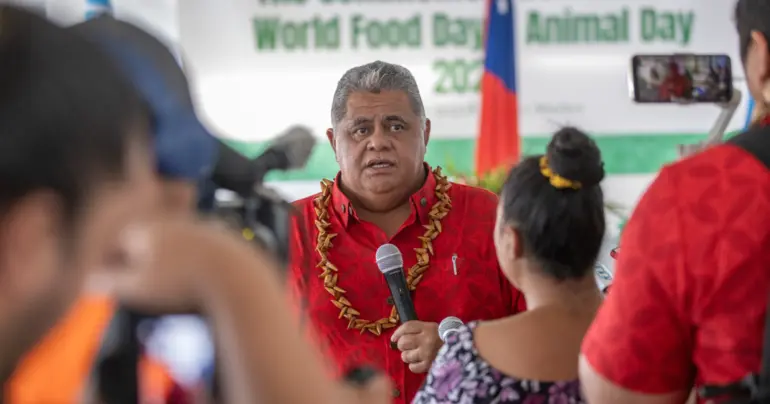Unanswered questions loom over candidate exclusions
 By The Editorial Board
•
28 October 2020, 12:00AM
By The Editorial Board
•
28 October 2020, 12:00AM
It was just over one week ago that the Prime Minister, Tuilaepa Dr. Sa'ilele Malielegaoi, found himself in a confessional mood.
At a Human Rights Protection Party (H.R.P.P.) ahead of the April election, Tuilaepa urged all of the party’s candidates to be forthcoming about their Police records during that week’s candidate nomination process.
The Prime Minister emphasised that candidates should go into extraordinary detail for the sake of transparency and cited as an example his own Police record.
“I forgot I was charged in 1972, some 48 years ago for double parking,” he told a Human Rights Protection Party caucus,” he said.
The Prime Minister was fined $2 for that transgression.
How prophetic Tuilaepa’s words seem now. After a rush of candidate registrations in which the number of people seeking to stand for election surged nearly 25 per cent we are now dealing with the aftermath. And what at first seemed like a democratic revival is being undercut by a preoccupation with details.
Candidates are locked in disputes with their villages about whether they have met their monotaga (service) requirements and are threatening legal challenges.
The role of village councils in pre-screening candidates and its effects on Samoan democracy, especially if looming Land and Titles Court (L.T.C.) legislation is passed is an issue worthy of exploration in itself.
But candidates are also finding themselves barred from running for reasons that seem almost as trivial as the Prime Minister’s own parking ticket after years in which, to understate matters, failing tests of character have proven no barrier to entering this nation’s Parliament.
But let us be clear. We have long advocated cleaning up Samoa’s public life in general and increasing the quality of this nation’s political representatives. We hold true to that position today.
There is nothing wrong in principle with people aspiring to represent their constituencies in Parliament having to pass tests that judge whether they are fit and proper people to serve in public office.
In several countries criminal records, or even bankruptcy, are reasons for which a potential candidate can otherwise be denied his God-given right to stand for Parliament.
But stories emerging about candidates’ disqualification in the wake of last week’s registration process, give rise to a question - why is the Government so suddenly preoccupied with running background checks on potential political representatives this election.
A story on the front page of Monday’s edition showed that what had previously been an extremely lax standard for entry into the Parliament has suddenly become extremely rigorous ("Minor" traffic offence disqualifies candidate).
I’a Sa’u Kaisara, of Tafagamanu and Savaia Lefaga, said he was dismayed to learn that crashing his car into a hedge, for which he was fined $400, was reason enough for the Office of the Electoral Commission to refuse to enroll him as a candidate.
Perhaps this is just a case of overzealous application of the rules, one driven by pure motivations.
But the question of why the interest in candidates’ background appears to have emerged suddenly has not yet been adequately answered by the Office of the Electoral Commission, from which we have been seeking comment.
Cases such as I’a’s are particularly remarkable because the quality and character of Members of Parliament in Samoa has been, to say the least, chequered.
Previous members of Parliament to have served in spite of their criminal record include those convicted of theft - and even first-degree murder overseas.
In this light, it seems obvious that the pendulum for political character tests appears to have swung back the other way without due warning.
Some of this can be explained by legal changes, including expanding the grounds on which a candidate’s background can be examined including criminal convictions to be subject to scrutiny by the Office of the Electoral Commission.
But other veteran campaigners are alleging that the Commission’s renewed interest in the rules has coincided with a surge of candidates for the April election, many of which are seeking the Government’s ouster.
Political veteran, H.R.P.P. exile and founder of the Faatuatua i le Atua Samoa ua Tasi (F.A.S.T.) party, Laauli Polataivao Schmidt says he has never seen an electoral registration process as rigorous as the one his party just went through.
“This has been one of the most difficult registrations I have ever been involved in,” he told the Samoa Observer.
“The Government has made it very tough [to register].
“They are taking away our fundamental rights to put extra burdens on us.”
F.A.S.T. anticipated the crackdown and armed its candidates with help from on-site lawyers to deal with any disqualification challenges.
Of course, even the H.R.P.P. has been hit by the new regulations with a total of ten of its candidates disqualified, it is revealed on the front page of today's paper.
But as the largest party by far and one that was seeking to whittle down its candidate numbers for strategic reasons anyway it is the least likely of all to be affected by the new regulation.
Again, it is difficult to argue against regulations designed to promote good character in Parliament.
But when they are applied selectively and for seemingly minor transgressions, even policies seemingly motivated by the best of intentions can become a way to stifle democracy.
 By The Editorial Board
•
28 October 2020, 12:00AM
By The Editorial Board
•
28 October 2020, 12:00AM










